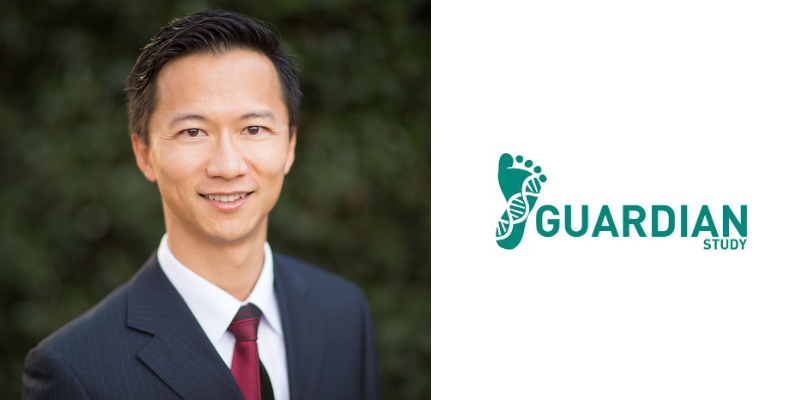Thought Leadership
Project GUARDIAN: Pioneering Genomic Newborn Screening for Rare Genetic Diseases
By Mike Hu, cofounder of Project GUARDIAN

The benefits of early diagnosis and treatment have been well documented, with plenty of examples in cardiovascular diseases, infectious diseases, and cancer. In rare genetic diseases, early diagnosis is arguably even more critical and can bring night and day differences in outcomes, just like what my kids have shown me.
In 2011, my sons were both diagnosed with Mucopolysaccharidosis Type II (MPS II). A single nucleotide change caused a key lysosomal enzyme to be non-functional. As a result, large sugar molecules called glycosaminoglycans (GAG) accumulate in all their bodily tissues, leading to joint contractures, organ malfunction, developmental delay, and eventually premature death. Following the same enzyme replacement treatment from the age of 4 and 1, their outcomes have been very different. While my older son has very stiff joints causing difficulties even for walking, his younger brother can swim and ride a bicycle. The younger one can also put together 300-piece puzzles while the older one can’t even finish a 12-piece.
Unfortunately, early diagnosis is far from the norm in rare genetic diseases. Diagnoses are typically prompted by emerging symptoms, and often take a long time due to the rarity of such diseases (AKA the “Diagnostic Odyssey”). As the symptoms are generally signs of accumulated irreparable damage, treatment attempts at correcting the root cause are doomed to have poor efficacy: how can we expect the necrotic joints and dead neurons to be revived by the replacement enzyme that could only slow down the GAG accumulation at best? The same treatment was much more effective for my younger son who benefited from his older brother’s diagnosis and started treatment when he was pre-symptomatic, when the damage was still minimal. This, in turn, becomes a critical challenge to therapeutic development. While it’s easy to recognize the importance of enrolling patients at a time when the treatment is most efficacious, the reality is that virtually all patients are only identifiable after symptom presentation, giving the clinical trials bleak prospects from the get-go.
How can we diagnose early before symptoms emerge? How can we treat early or enroll patients when the drug candidate has the best chance to be effective? The answer lies in newborn screening (NBS). From phenylketonuria (PKU) to spinal muscular atrophy (SMA), the transformative power of early identification and effective treatment for dozens of rare genetic diseases has been demonstrated by the millions of babies whose lives have been saved. In the US, NBS is a national public health program with state infrastructure to screen for up to 63 diseases on the Recommended Universal Screening Panel (RUSP). A nomination system is in place to add conditions to the RUSP when there is sufficient evidence that newborn screening for the condition meets technical standards, is accepted by parents, and has available effective treatment. This approach is not without its own challenges, of course. The process to get a single condition through from nomination to decision takes 4-6 years on average. In the past 15 years, only 8 conditions were added to the RUSP. The lack of neonatal natural history, prospective screening data and effective treatments, and the high costs of screening are all nearly insurmountable for individual disease nominations.
GUARDIAN (Genomic Uniform-screening Against Rare Diseases In All Newborns) aims to change this. Our goal is to enable the screening of newborns using genome sequencing to identify pre-symptomatic babies and support early intervention by either using existing treatments or enrolling in clinical trials of novel treatments, all at a disease stage when treatment could be maximally efficacious. Sequencing based genomic NBS can significantly expand NBS to rare genetic diseases with a single common platform and provide synergies across conditions to decrease the cost per condition for screening and de-risk the strategy across diseases/companies supporting the platform. Investment in pilot studies of genomic NBS will support clinical trials to develop new treatments and will identify infants who are candidates for treatment once those medications/treatments are FDA approved. GUARDIAN is led by Dr. Wendy Chung who previously led the SMA NBS pilot study that serves as a prime example of a public-private collaboration, which successfully transformed a once deadly disease from no treatment and rejected by the RUSP to having multiple effective treatments and successfully being added to the RUSP. Most importantly, SMA babies undergoing timely treatment have been growing, meeting milestones, and enjoying their lives like other children. Under Dr. Chung’s leadership, GUARDIAN was launched in 2022 in New York state. With over 5000 babies already enrolled, the study is a multi-year pilot research program aimed to enroll a minimum of 100,000 newborns and screen them with a starting panel of ~250 diseases (and growing). Families with newborns who screen positive are offered information about all treatment options and clinical trials available to facilitate early treatment. Natural history and long term follow up and outcome data are being collected for all babies who screen positive. The results will be used to demonstrate the benefits of NBS for these conditions to support a RUSP nomination for routine screening.
The GUARDIAN team believes that all babies affected by severe genetic diseases deserve what the SMA babies have benefited from. We need your support! Contact us today to discuss how you can help, and together, let’s make sure all beloved babies have a healthy start.